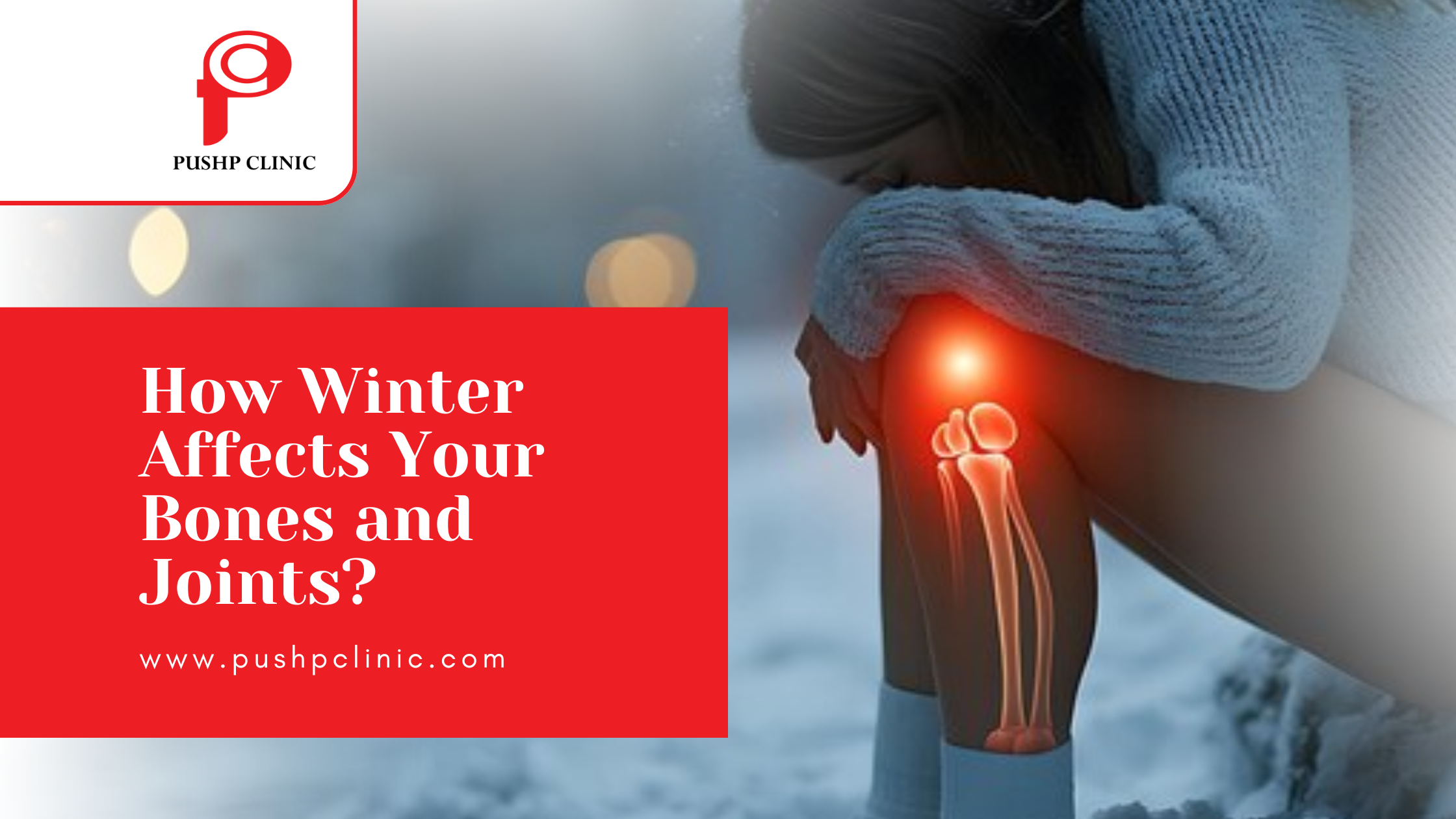Winter is a season that is famous for chilly weather and cozy vibes. However, when it comes to your joints and bones, it’s not at all fun and games.
For some, the colder months can bring lots of challenges to the joints instead of just a drop in temperature and fun; they can struggle with aches, stiffness, and discomfort. Have you ever thought about why your joints hurt more during winter?
Let’s dig deep into how the cold weather affects your bones and joints, and what the ways are to keep them healthy with the Best orthopedic surgeon in Indore at Pushp Clinic.
Why Do Your Bones and Joints Hurt More in Winter?
When the temperature starts dropping, your body has to work harder to stay warm. But this cold weather affects your bones and joints in several ways:
- Cold Weather Tightens the Blood Vessels
In cold weather, your body starts to conserve heat by narrowing blood vessels, a process known as vasoconstriction. This restricts the flow of blood to your muscles and joints to some extent.
When blood circulation is reduced, the joints may not be able to get enough oxygen and nutrients, causing stiffness and pain.
- Drop in Barometric Pressure
Barometric pressure, the weight of the air, usually drops during the winter months. This makes the tissues surrounding your joints swell, leading to increased pressure on the joints themselves.
People who are already struggling with arthritis or joint issues often feel these changes more intensely, leading to more pain and discomfort.
- Less Physical Activity
During the colder months, many people choose to stay indoors more often, reducing their level of physical movement, which makes the muscles and joints stiff. Regular activity helps keep your joints lubricated and flexible, so when you’re less physically active, it makes your bones and joints feel tight and sore.
- Dry Air
In cold and dry weather, the body also dehydrates, especially the cartilage in your joints. When joint issues are a concern, we tend to drink fewer fluids, which reduces lubrication, making living with joint pain highly discomforting.
Cartilage, which acts as a cushion between bones, needs to be well-hydrated to maintain its flexibility, but it tends to be less hydrated during winter.
Common Winter Joint Problems
Here are some common problems related to joints addressed by the Best orthopedic surgeon in Indore that are often worsened by the colder weather:
-
Arthritis
The most common condition people experience in the cold months is arthritis. This condition causes swelling, redness, and pain in the joints. During winter, the condition worsens, especially in the hands, knees, and hips, as the cold temperature makes the essential fluid known as synovial fluid, present in the joints, thicker. This makes movement more difficult.
-
Osteoarthritis
This is a type of arthritis that occurs when the protective cartilage at the ends of your bones wears down over time, causing pain and stiffness.
-
Rheumatoid Arthritis
Rheumatoid arthritis is a disease related to immune functioning in which the immune system mistakenly attacks the joints. In this condition, the immune system treats the joints as if they are harmful germs. As a result, it sends inflammatory cells to attack the joints, causing swelling and pain.
-
Tendonitis
Tendonitis is when the tendons, the tissues responsible for connecting bones to muscles, become swollen and painful. This is common in cold weather, as the cold causes blood vessels to shrink, reducing blood flow to the tendons
How to Protect Your Joints in Winter
Let’s talk about how you can help keep your bones and joints healthy during these colder months with tips shared by the best orthopedic surgeon in Indore:
- Stay Active –
Regular exercise, walking, and stretching indoors can help keep your bones flexible and prevent stiffness.
- Keep Your Body Warm –
Dress in warm clothes and ensure your joints are properly covered. This helps protect your body parts from the direct impact of cold weather.
- Use Heat Therapy –
Applying a warm compress or heating pad to painful areas can increase blood circulation and soothe stiff muscles. Just make sure it isn’t too hot to avoid burns.
- Drink Enough Water –
Staying hydrated helps prevent dehydration, which allows the joints to stay lubricated and prevents stiffness.
- Eat Nutritious Food –
Include foods rich in omega-3 fatty acids and vitamin D, which help reduce inflammation in the joints. Also, ensure to eat foods high in calcium to keep your bones strong.
When to Seek Medical Help
While mild stiffness and discomfort is not a major matter of concern in the season of cold, if it exceeds there are chances that it is pointing towards the major issue. ensure seeking medical help if:
- The pain is not reduced with rest or pain medications.
- You are finding issues in moving or using the affected joint.
- Noticing swelling, redness, or warmth around the joint.
Conclusion
Winter can be a little hard on your bones and joints, but it’s not like it’s unmanageable. You can manage it well, with the right care.
Ensure to follow the essential tips to keep your bones healthy and strong. If you’re dealing with severe pain or noticing any stiffness in your joints that’s not usual, don’t wait—visit a hospital that specializes in orthopedic conditions, like Pushp Clinic. It’s where the best orthopedic surgeons work and bring effective results. For Indore, Pushp Clinic becomes the first choice. After all, your bones matter for a strong and healthy tomorrow.
